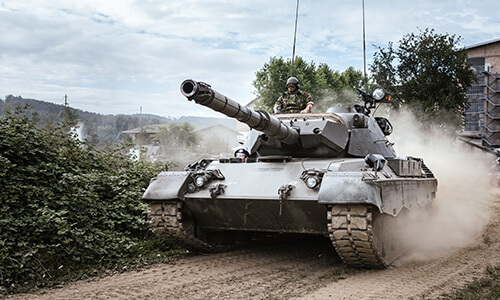One of the most important roles that a teacher and a parent plays in the lives of children under their care, is to keep them safe and secure, especially in times of turmoil.
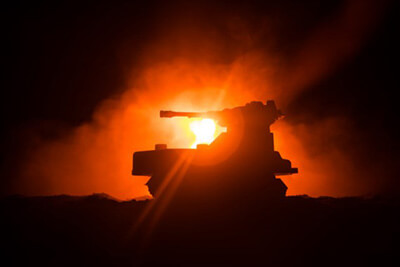
When rage, conflict and war make the headlines, children see disturbing images on television, or the internet, or on their digital phones. They may also hear things from friends, playmates, as well as other children and adults (worsened, like Chinese whisper, with each oral transfer), about what is happening in society, their city, their country and in the world, including frightening possibilities about what could happen to them! Lately, viral forwards on social media of horrific videos on local riots, accidents, heinous murders caught live on video, war crimes and atrocities against women and animals, have created feelings of fear, stress, sadness, anxiety, and even anger among children, across all age-groups.
Talking with kids about violence and world conflict can be hard, but it is important. Whether it is situations of conflict in Ukraine, Middle East, Canada, closer home at Manipur, Punjab, Bihar…. even at school and in their homes. As mentioned in the podcast, the way real life unfolds is often not outside the Lakshman rekha of the cocoon of bliss we have chosen to create for our children. We would be making a gross mistake if we were to believe that by not talking about it, our kids will be ‘ok’. We would be making a bigger mistake to assume that conflict and war would never touch our lives – so why talk about it!
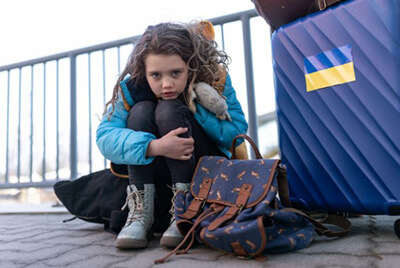
This is very similar to the taboo we see around (in general), of families hesitating or absolutely avoiding openly discussing the nuances of physical expressions of affection or abuse – now titled Good Touch-Bad Touch. We must understand that Knowledge is Power, even in situations of conflict and war. Being well-informed, means being well-guarded and being safe.
How does one initiate the conversation?
If you are now convinced that one MUST talk about conflict & war, you would probably be wondering about how to begin; how to help your kids make sense of what’s going on in the world? It is well said that before we discuss a topic with another, we must first have a certain level of understanding about it; in this case, learn about the politics and culture in the conflict-ridden areas and understand the events that triggered the conflict or war.
It is advisable to initiate the discussion only when you can give your full attention and time – a good starting place is at dinner when everyone is around or pre dinner (avoid pre-bedtime, as it may disturb their sleep).
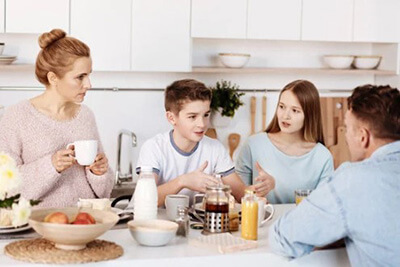
One can begin with something like, “What have your friends and playmates been talking about?” or “What have you heard about what’s going on?” Then give them time to voice their thoughts or concerns. Let children freely express what they’ve heard (objective or biased), what they’re feeling (like confusion, fear, sadness, or anger) without judging or offering an immediate opinion.
Instead of casually sliding it off with, “Don’t worry about it,” it is better to repeat back the concerns with something like, “Yes, I can see why this makes you upset / fearful.” This helps children feel heard and understood. It’s even OK for adults to admit that violence upsets them as well. Let kids know that families being hurt or killed is hard for anyone to hear, so they are not alone.
Another pointer to bear in mind is that we must be open to the quantum and nature of information being shared by children; how much they know, how distorted, or how little they wish to share; but we must pay close attention to their emotions. It is quite possible to be faced with any combination of these scenarios; some children…
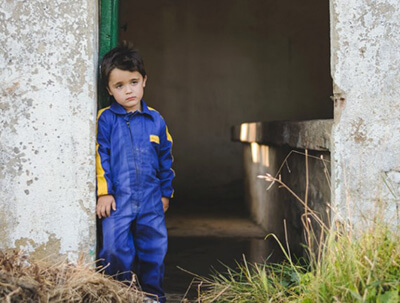
- may know very little about it and aren’t interested to share anything,
- may keep mum, but worry in silence,
- may actually open up and share details,
- may be unable to distinguish between images on screens and their own personal reality (especially the little ones), and may believe they are in immediate danger, even if the conflict is happening far away,
- (older ones) may have seen troubling things on social media and be worried about how the war or conflict might worsen.
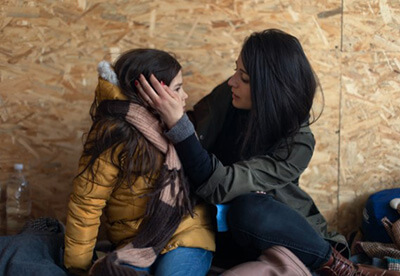
Whatever the sharing, it is important to not reduce or disregard their worries or be too hasty in correcting them. As you show that you are interested by listening to them with your full attention, they will be more likely to open up to you and other trusted adults, now and in the future. The key is to hold up a figurative emotional mirror, reflect what you see, and offer compassion as you reassure them of their safety. Let them share freely and then choose the right words and moment to bring in clarification where needed.
How much should one share and clarify?
Children grow and develop differently, including in their emotional and mental abilities to process images and information. Currently, across many homes, it is normal for parents to spend time watching the news and feeling emotions of worry, sadness, and anger in times of war and conflict. While children have a right to know what’s going on in the world, adults should use wisdom and discretion in how much detail to share.
It’s best to be honest and explain things based on the kids’ age and maturity. Use age-appropriate words, watch their reactions, and be sensitive to their worries.
- Early grade school: Keep things short and simple, like, “People are fighting, and some are getting hurt.” Things like visual displays may help them to understand. For example, if they ask where it’s happening, you can show them on a map. End the talk by reminding them that the adults in their lives keep them safe.
- Older kids: You can give extra information but avoid graphic details. Children this age may ask more questions, and it’s OK to answer them briefly. You don’t need to tell them more than they ask. Sometimes kids may want to read an article with you, but make sure it’s right for their age.
-
Teens: Teens will likely know more about what’s happening and may have strong feelings. Encourage them to share by asking, “What do you think about what’s going on?” Let them lead the conversation. Then try to answer any questions they have. If you don’t know how to respond to something, explain that the issues are complex.
Very often adults may feel stuck with the clarification with older children – it’s okay not to have the answers to every question. You could seek time to look it up or you could use that moment as an opportunity to find the answers together. Use websites cautiously; stick to reputable news organizations or international organizations like UNICEF and the UN. Explain that some information online may not be accurate, and play-up the importance of finding reliable sources.

Also, with older kids and teens, if you feel that your children are likely to experience the wrath of some conflict / war, make them aware of the government protocols for safety. If the conflict is closer home and among school / society peers, teach them the life-skills of knowing when & how to engage in strife (preferably sticking to verbal exchanges, not physical) and when to step back for a higher ideal, keeping one’s ego at bay.
You know your child best. Remember that children take their emotional (and other) cues from adults, so use your time with wisdom, objectivity and discretion. Be cautious in oversharing your emotions and opinions with them. The key is to calm fears and reassure children of their safety.
What about access to news and social media?
Cocooning them completely really doesn’t work, since the access to information these days is so varied and so quick. There may be a lot of scary stories and videos online when conflict happens. If kids are on social media, more of these are likely to show up in their feed.
What you could do for a start is that – for younger kids, you can block certain apps and websites; and for the older ones, talk about it with them and try these tips:
- Defining limits. You can talk about how tempting it can be to go online, but explain that some photos and videos may be very upsetting, even for adults. Talk to them to explain that they cannot enjoy around-the-clock access; you would need to work out mutually agreed upon ground rules on what apps they can use and limiting time on social media. By installing an app to monitor screen time, you can keep check on what and how much of screen time your child is being exposed to.
 Sharing with Caring. New age kids freely post things online, but some posts could be hurtful to others and even dangerous. Talk to your kids that videos, images, and websites can cause strong reactions in people who are affected in conflict and war situations. Create a family / school culture of NOT forwarding or sharing anything related to violence (no matter how dramatic or exciting it may seem). If they want to post or repost something about a conflict that’s not related to violence, they should seek your guidance and approval first.
Sharing with Caring. New age kids freely post things online, but some posts could be hurtful to others and even dangerous. Talk to your kids that videos, images, and websites can cause strong reactions in people who are affected in conflict and war situations. Create a family / school culture of NOT forwarding or sharing anything related to violence (no matter how dramatic or exciting it may seem). If they want to post or repost something about a conflict that’s not related to violence, they should seek your guidance and approval first.-
Monitor and be available, because you care – not control! Remind your kids that you’re there to support and protect them. If they see something upsetting, you want to hear about it and make sure they’re OK. When you notice them watching something, ask if they’d like to chat about it with you. If kids want to stay informed, encourage them to follow accounts that you know provide accurate information.
Also, as conflicts arise and news stories gain attention, be sure to check in regularly to see how children feel about the escalated / continuing war and conflict. Do they have more questions? Are they interested in getting your perspective? Do they want to clarify something they heard or saw?
 Pathways for good information. To give kids a break from situations of news and views about conflict and war, bookmark some sites where they can find good news that’s right for their age – like GK trivia, or new technology in cars / bikes / rockets, or what’s trending in music and fashion!
Pathways for good information. To give kids a break from situations of news and views about conflict and war, bookmark some sites where they can find good news that’s right for their age – like GK trivia, or new technology in cars / bikes / rockets, or what’s trending in music and fashion!
What else can one do?
In addition to the above, one can be caring, supportive adults who offer a positive, flavour to life’s mishaps. You may like to refer to these tips:
- Spread compassion, not stigma. News stories and images from war and conflict can stir up strong feelings, which can create prejudice and discrimination against a people or a country. When speaking with or around children, avoid labels and name calling, such as “bad people” or “evil” and instead use it as an opportunity to encourage compassion, such as for the families who have lost members or those forced to flee their homes.
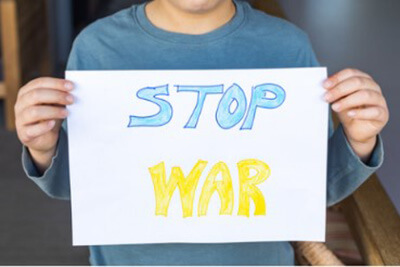
Focus on those who are doing good. To offer hope, remind your children that many people are working hard around the world to stop the conflict / war and find peaceful resolutions. It’s important for children to know that there is good in the majority of people and that people are doing good for those who suffer from war and conflict. Find and share stories of helpers and heroes who serve and sacrifice for the benefit of those who are affected by war.
Talk with children about ways they can help – like making cards / writing letters and posting them on social media. The sense of doing something, no matter how small, can often bring great comfort.
- Exemplify your clarification with nature’s recovery after a natural calamity. Children will be able to see that the order of the world does not support stress, conflict, disaster for long – there is hope in recovery and getting back to a better world, even if not the same. The indomitable spirit in man to improve and inherently seek balance, is also present in the earth, flora and fauna.
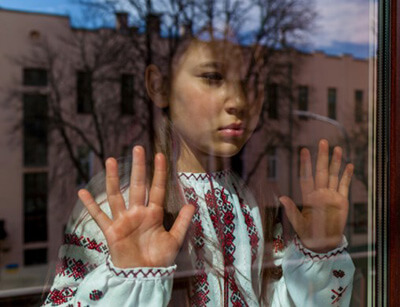
As you traverse this journey of talking to kids about conflict & war, bear in mind that children have different reactions to stressful events and some signs of distress might not be so obvious. Younger children may become clingier than usual, while teens might show intense grief or anger. Be alert about your child – whether s/he seems worried or anxious about what’s happening; be aware of any changes in how they behave or feel, such as stomach aches, headaches, nightmares, sleep-walking, bed-wetting, difficulty sleeping. Many of these symptoms last for a short time and are normal reactions to stressful events. If any condition prolongs, it is advisable to seek professional help to help the child come through without emotional scars.
Let your children know that you’re always open to talking more. Just being present is a huge part of supporting kids during times of conflict & war. Being consistent, open to talk and caring helps them feel protected. ***
Some links you can access to learn more:
https://beaconhouse.org.uk/wp-content/uploads/2022/03/Talking-to-children-about-war-and-conflict.pdf
https://www.unicef.org/parenting/how-talk-your-children-about-conflict-and-war
(Pictures from CANVA)

